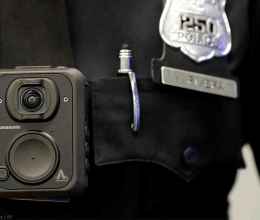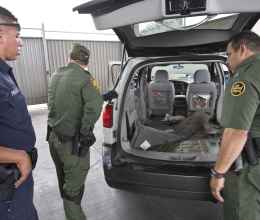
The following was originally published in the Los Angeles Times.
We should not shred the Constitution in the face of tragedy. In the wake of the shooting death of Kathryn Steinle in San Francisco, the Sheriff's Department is being blamed for having released the man now charged with killing her, Juan Francisco Lopez-Sanchez, from jail. Presidential candidate Hillary Rodham Clinton, among others, has said the city should have honored a federal request, known as a detainer, to keep Lopez-Sanchez in custody.
But the county sheriff had no legal authority to hold Lopez-Sanchez: To honor the detainer would have violated the 4th Amendment. An Immigration and Customs Enforcement detainer is not a warrant. It is not issued by a judge. And it is not based on a finding of probable cause. It is simply a request that a law enforcement agency detain an individual after his or her release date in order to provide ICE agents extra time to decide whether to take the individual into federal custody and then deport him.
ICE's use of detainers to imprison people without due process or probable cause — including not just those here without authorization but also green card holders and even U.S. citizens — raises obvious and serious constitutional concerns. Indeed, a series of federal court decisions issued last year held that detainer requests are non-binding and that local law enforcement agencies are liable for holding people beyond their release times solely on the basis of the detainers. In November 2014, Jeh Johnson, the secretary of the Department of Homeland Security, acknowledged "the increasing number of federal court decisions that hold that detainer-based detention by state and local law enforcement agencies violates the 4th Amendment."
As a result of these court decisions, jurisdictions across the country, including approximately 50 of California's 58 counties, will comply with immigration detainer requests only when they are accompanied by a judicial warrant or a judicial determination of probable cause — in other words, when constitutional requirements have been met.
Federal officials turned Lopez-Sanchez over to the San Francisco Sheriff's Department in March; they knew where he was and they should have known what they needed to do in order to ultimately deport him. Why did they merely issue a detainer? Why didn't they go to court to obtain a warrant?
ICE, through its spokeswoman Virginia Kice, has said that "obtaining judicial warrants is not only unnecessary, it would place an immense burden on both ICE and the federal courts."
But the federal court decisions contradict that. The Constitution isn't optional. It can't be disregarded for the sake of the government's convenience. So add these to the list of questions: How do federal officials believe their position can be squared with the 4th Amendment, and why is it that police across the country are able to routinely satisfy the warrant requirement, but ICE agents cannot?
These issues won't get their due if Lopez-Sanchez becomes the Willie Horton of immigration policy, distorting the politics of immigration reform generally and in particular the debate between federal authorities and local jurisdictions.
Horton, a murderer who was furloughed from prison and then committed assault and rape, starred in a lurid campaign ad in 1988; and his story was used to label politicians as soft on crime. In reaction, an explosion of tough-on-crime laws fueled the prison-industrial complex we're only beginning to dismantle today. Now we may witness the rise of a "soft on immigration" label, with politicians one-upping each other to show how tough they can be, illegally and unwisely entangling local police in immigration enforcement.
The most crucial question Steinle's tragic death raises is this: Why does ICE continue to ignore what law enforcement has repeatedly told us: Local policing must be decoupled from immigration enforcement. Surely, the government can establish a system that does not require choosing between honoring the Constitution and complying with detainer policies that violate the 4th Amendment.
Hector Villagra is executive director of the ACLU of Southern California. Follow ACLU_SoCal.

